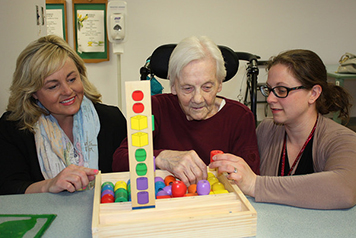Menu
- Home
- About Us
- Patients & Visitors
- Join Our Team
- Programs & Services
- Contact Us
A new provincial leadership role confirms the positive work that’s taken place to enhance health care services for people with challenging and complex behaviours and their caregivers who live in the North East region.
Ontario’s 14 LHINs have agreed to a single provider to lead the Ontario-wide work of Behavioural Supports Ontario (BSO), a provincial project that provides support for older adults with ‘responsive’ behaviours which can range from roaming, to withdrawing, to verbalizations and striking out.

Monica Bretzlaff, BSO Provincial Manager (left), and Nurse Practitioner Shannon Cadieux (right), facilitate a Montessori-based dementia activity with Gert.
Monica Bretzlaff, North East BSO Regional Manager with the North Bay Regional Health Centre (NBRHC), will serve as the BSO provincial manager, and with the NE LHIN hold the Accountability Agreement on behalf of all LHINs. This decision was based on positive feedback and outcomes of work that Bretzlaff and her NE BSO regional team have accomplished to date.
Bretzlaff will be responsible for provincial BSO deliverables related to tracking information and sharing it with the LHINs and the Ministry of Health and Long-Term Care, and working with the Alzheimer’s society and other provincial associations to better the care for people experiencing responsive behaviours.
“The BSO provincial steering committee and I look forward to continuing the great work accomplished across the province to support people living with responsive behaviours, and their families,” said Donna Cripps, BSO Project Executive Lead and CEO, Hamilton Niagara Haldimand Brant Local Health Integration Network. “The momentum that has been created across all 14 LHINs is exciting. The improvements that have been made must be expanded and built upon, and having dedicated leadership will ensure we continue to focus on the needs of people in our communities.”
“The North East LHIN has invested in specialized training for more than 70 front-line workers, and leveraged BSO training for another 7,500 practitioners already working in the field, to provide older adults with the care they need, as well as coaching families and staff on strategies to help prevent and respond to responsive behaviours,” said Louise Paquette, CEO, NE LHIN. “We look forward to continuing our work with partners to further spread the success of BSO across the region.”
Four integrated BSO response teams of staff are based in community, hospitals, tertiary care and long-term care homes within Northeastern Ontario (Sudbury-Parry Sound-Manitoulin, Nipissing-Temiskaming, Cochrane and Algoma). Focused on enhancing care and capacity, these hub teams are also linked with key medical and psychiatric specialists who serve as instrumental change agents.
“The greatest reward for impacting change is the opportunity to keep change evolving,” said Monica Bretzlaff. “I am honoured and excited to represent our NE LHIN, NBRHC and my esteemed regional and provincial care partners in this person-family centred care revolution. Together, we will continue to drive positive system transformation that remains firmly grounded in the lived experience!”
More than 3,170 clients and family members were provided support through BSO in 2013/14, with close to 87,000 client-based services delivered and 6,700 participants in structured learning events.
The NE LHIN and NBRHC are committed to continue to guide the spread of the BSO initiative across the North East, and build upon the provincial platform in collaboration with partnering LHINs.
Facts:
-30-
For more information: Please contact Kathleen Bain, Communications Officer with the NE LHIN, at kathleen.bain@lhins.on.ca or 705-840-2340.